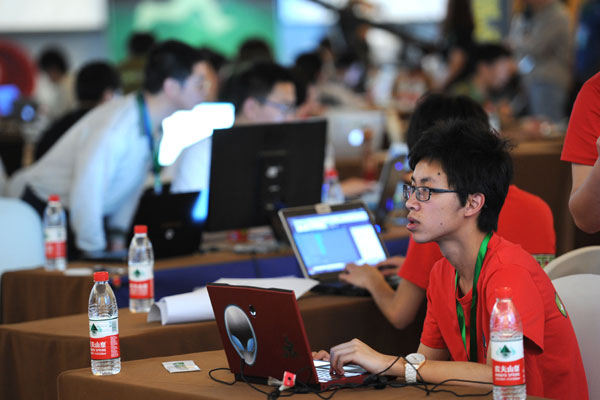 |
|
Participants compete in a national cybersecurity skills contest in Nanjing, Jiangsu province, on May 2, 2014. China announced on Thursday that it will begin cybersecurity vetting of major computer and network products and services. [SUN CAN/XINHUA] |
Foreign technology companies will have a hard time in China - at least in the short run - after the world's largest computer and Internet market is set to impose a review policy on imported network and technology equipment and services.
The country will launch a cybersecurity testing program on major information technology products and services used in national security and other public interest segments, a government statement said on Thursday.
Analysts said the announcement comes as China confronts the United States on Internet safety issues.
 |
 |
Gene Cao, senior analyst at Forrester Research, said: "With tightening supervision measures on overseas IT products in government procurement, businesses in the affected sectors will be less willing to buy from foreign companies."
Microsoft, Cisco and Juniper Networks declined to comment on Thursday.
"I don't think the vetting program will have any big impact on IBM's business in the country," said an anonymous source at the US company. "We have been providing IT products in mission-critical sectors such as finance. An industry-level IT system testing mechanism has been in place for many years."
Less than a week ago, China barred newly purchased government computers from installing Windows 8. Microsoft described the decision as "unexpected".
It is clear the government wants to see a higher adoption rate of local IT products. But years of official support failed to produce IT products strong enough to challenge global giants.
In February, Red Flag Software, once the largest Linux-based software vendor in China, closed because of poor financial performance.
The company, backed by the Chinese Academy of Sciences, was the biggest challenger of Windows systems in China, but it gained only a little brand awareness, even in State-controlled government projects.
Technological advantages may help overseas companies to survive in China despite tightening regulations, analysts suggested.
"Foreign vendors should localize more products and services in the country," said Cao from Forrester.
"They need to operate in China like local companies do."
Xinhua contributed to this story.
